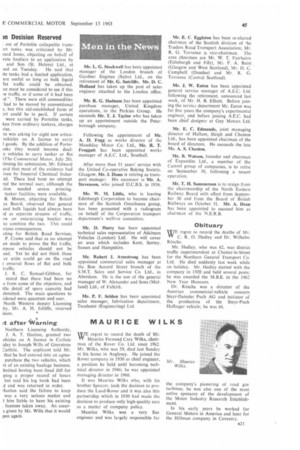)n Decision Reserved
Page 47

If you've noticed an error in this article please click here to report it so we can fix it.
use of Portolite collapsible transart tanks was criticized by Mr. card Jones, objecting on behalf of vate hauliers to an application by and Son (St. Helens) Ltd., at ool on Tuesday. He said that ite tanks had a limited application, ere useful so long as bulk liquid iat traffic could be obtained. Lce must be considered to see if this Ay traffic, or if some of it had been :4:1". There were still commodities had to be moved by conventional s, but this old-established form of art could be in peril. If certain were carried by Portolite tanks, ken from ordinary tankers, charges rise.
an was asking for eight new articuvehicles on A licence to carry I goods. By the addition of Portoinks they would become dual e vehicles to carry tanker or flat (The Commercial Motor, July 26). tinning his submission, Mr. Edward ;aid that most of the evidence had iveit by Imperial Chemical Indus.td. There had been no attempt :nd the normal user, although the .tion needed severe pruning.
tanker facilities were available.
B. Mason, objecting for British ys Board, observed that general and bulk liquids had always been xl as separate streams of traffic, 3w an enterprising haulier was to combine the two. This could :rious consequences.
cling for British Road Services, P. Crowe said that as no attempt en made to prove the flat traffic, irpose vehicles should not be zed. Yet he did not think these ye units could go on the road t ensured flows of flat and bulk traffic.
J. R. C. Samuel-Gibbon, for stated that there had been no c from some of the objectors, and ttle, detail of spare capacity had abmitted. The main questions to ;idered were quantum and user.
North Western deputy Licensing ity. Mr. A. H. Jolliffe, reserved ision. •




















































































































